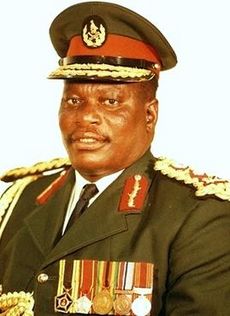Solomon Mujuru facts for kids
Quick facts for kids
Rtd. General
Solomon Mujuru
|
|
|---|---|
 |
|
| Second Gentlemen of Zimbabwe | |
| In office 6 December 2004 – 15 August 2011 |
|
| President | Robert Mugabe |
| Preceded by | Maud Muzenda |
| Succeeded by | Auxillia Mnangagwa |
| Commander of the Zimbabwe Defence Forces | |
| In office 1981–1992 |
|
| President | Robert Mugabe |
| Preceded by | Peter Walls |
| Succeeded by | Vitalis Zvinavashe |
| Personal details | |
| Born |
Solomon Tapfumaneyi Mutusva
5 May 1945 Enkeldoorn, Southern Rhodesia |
| Died | 15 August 2011 (aged 66) Alamein Farm, Beatrice, Zimbabwe |
| Resting place | National Heroes Acre |
| Nationality | Zimbabwean |
| Political party | ZANU-PF |
| Spouse | Joice Mujuru |
| Residence | Alamein Farm |
| Occupation | Military leader, Politician |
| Nickname | Rex Nhongo |
| Military service | |
| Allegiance | |
| Branch/service | Zimbabwe National Army Zimbabwe African National Liberation Army |
| Years of service | 1964–1990 |
| Rank | General |
| Battles/wars | Rhodesian Bush War |
Solomon Mujuru (born Solomon Tapfumaneyi Mutusva; 5 May 1945 – 15 August 2011), also known by his war name, Rex Nhongo, was a Zimbabwean military leader and politician. He led Robert Mugabe's forces during the Rhodesian Bush War. After Zimbabwe became independent, he became the army chief. He later entered politics as a Member of Parliament. His wife, Joice Mujuru, became Vice-President of Zimbabwe in 2004.
Contents
Biography
Early Life
Solomon Tapfumaneyi Mutusva Mujuru was born in Enkeldoorn, which was then called Southern Rhodesia. He grew up in the Chikomba area. Solomon became interested in politics when he was young. He was arrested for his activism while studying at Zimuto High School. He then joined the youth group of the Zimbabwe African People's Union (ZAPU).
In 1966, he was arrested again by the Rhodesian authorities. He was sentenced to two years in prison. After his release, Mujuru went to Lusaka, Zambia. There, he was chosen for guerrilla training in the Soviet Union.
Zimbabwe War of Liberation
During the Zimbabwe War of Liberation, Solomon Mujuru, along with Josiah Tongogara, led the Zimbabwe African National Liberation Army (ZANLA). This was while Robert Mugabe was in jail from 1964 to 1974. After Mugabe was released, he went to Mozambique with Edgar Tekere. Mujuru then asked the fighters to accept Mugabe as their leader.
In 1976, Mujuru was made military chief of the Patriotic Front. This group combined ZAPU and Mugabe's Zimbabwe African National Union (ZANU). From 1976 to 1979, he planned and managed ZANLA operations inside Rhodesia. In 1980, he helped to bring former guerrillas together at special points. These points were watched by forces from the Commonwealth.
After Independence
After Zimbabwe gained independence, Mujuru was promoted to general in the new Zimbabwe National Army. He helped combine ZANLA fighters into the Zimbabwe Defence Forces. He became the chief of the army after Lieutenant-General Peter Walls left. Mujuru retired in 1992 to start his own businesses.
As a civilian, he became important in the Zimbabwe National Liberation War Veterans Association. He worked to get more support for veterans. He also pushed for veterans to have a big role in the land reform programme.
Politics
Many people believed that Mujuru had a lot of power in deciding who would lead the ZANU-PF party and the country. He was seen as the only person strong enough to challenge Mugabe during party meetings. He remained an important member of the ruling ZANU-PF politburo and central committees.
Business and Farming
Solomon Mujuru was a successful businessman and farmer. He supported and benefited from programs that helped black Zimbabweans own more businesses. He had many different businesses. These included mining, farming, transport, tourism, and construction.
He was known to own several farms, including Alamein Farm. He took over Alamein Farm from Guy Watson-Smith in 2001. At the time, the Supreme Court of Zimbabwe said his takeover of Alamein Farm was against the law. On Alamein Farm, Mujuru grew tobacco and maize. He also raised game animals. Farm workers on his land also grew their own tobacco.
Death
Solomon Mujuru died in a fire on 15 August 2011. The fire happened at his home on Alamein Farm. His remains are buried at Heroes Acre. This is a special memorial site in Zimbabwe.
 | Aurelia Browder |
 | Nannie Helen Burroughs |
 | Michelle Alexander |

